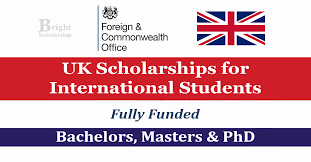Fully Funded Scholarships in the UK — 2025 (Comprehensive guide)
Studying in the United Kingdom on a fully funded scholarship is a life-changing opportunity: you get world-class education, international networks, and the financial freedom to focus on learning and impact rather than tuition and living costs.
In 2025 the UK continues to offer a rich ecosystem of fully funded scholarships—from longstanding government schemes to prestigious university awards. This guide explains the biggest fully funded programmes for international students in 2025, who’s eligible, what they cover, how to apply, useful timelines, and practical tips to give your application the best possible chance.
The major fully funded UK scholarships to know in 2025
Below are the flagship schemes most international applicants target. Each of these is highly competitive; read the eligibility and application sections carefully.
1. Chevening Scholarships (UK Government)
Chevening is the UK government’s global scholarship programme for future leaders. It funds one-year master’s degrees at UK universities and is explicitly described as a fully funded scholarship that covers tuition, living allowance, travel to/from the UK, and other essential costs.
Selection is made by British embassies and high commissions in each country and emphasizes leadership potential and influence. CheveningStudy UK
Who should apply: Mid-career professionals who can demonstrate leadership and a desire to return home and apply their learning for national/regional benefit.
2. Commonwealth Scholarships (Commonwealth Scholarship Commission)
The Commonwealth Scholarship Commission (CSC) awards fully funded scholarships (Commonwealth Shared Scholarships and other CSC schemes) for students from eligible Commonwealth countries to pursue full-time master’s or PhD study.
Most award packages cover tuition fees, return airfare, and a living allowance—making them effectively fully funded for scholars who qualify. These scholarships prioritise candidates whose study will contribute to development goals in their home countries.
Who should apply: Applicants from eligible Commonwealth countries, often focused on development-related subjects and clear development impact.
3. Gates Cambridge Scholarship (University of Cambridge)
Gates Cambridge is one of the most generous university scholarships in the UK and provides full-cost funding for postgraduate study at Cambridge (covering tuition, maintenance allowance, visa and health insurance, and other approved expenditures).
It’s aimed at outstanding candidates from outside the UK who demonstrate intellectual ability, leadership, and a commitment to improving the lives of others.
Who should apply: Exceptional international applicants to Cambridge for postgraduate study (particularly PhD and many master’s courses).
4. Rhodes Scholarships (University of Oxford)
The Rhodes Scholarship is one of the oldest and most prestigious scholarships worldwide. Rhodes Scholars receive coverage for University of Oxford course fees and an annual stipend to support living expenses.
The award targets students with outstanding academic records, leadership qualities, and a commitment to service. While award amounts and conditions can vary by constituency, Rhodes remains effectively fully funded for selected scholars.
Who should apply: Exceptional students from Rhodes constituencies (countries/regions defined by Rhodes Trust rules); the program often favors those with proven leadership and service records.
5. Clarendon Scholarships (University of Oxford)
Clarendon is a major Oxford scholarship fund which offers over 200 new fully funded scholarships each year for outstanding graduate students across the university.
Clarendon awards cover tuition and college fees in full and provide a generous grant for living costs for full-time courses—so they are essentially fully funded scholarships for selected applicants. University of OxfordScholarships for Development
Who should apply: Highly competitive: academic excellence is the main criterion. Clarendon grants are open to all graduate applicants to Oxford (no separate Clarendon application—candidates are automatically considered when they apply for admission).
Other high-value schemes worth considering
-
Marshall Scholarships — Awards for outstanding U.S. citizens to pursue graduate study in the UK. Marshall Scholarships typically fund 1–3 years of study and cover university costs, living expenses, and travel. (Eligibility is limited to U.S. citizens.)
-
GREAT Scholarships / British Council partnerships — The GREAT campaign and British Council facilitate scholarships across a number of UK universities (often offering significant tuition waivers or awards up to a stated amount). Some participating institutions offer awards that effectively cover most costs for targeted countries and programmes. Check participating universities for country-specific GREAT scholarships for 2025–26.
-
University-specific full funding — Many UK universities (University of Edinburgh, UCL, Imperial, Warwick, etc.) run generous doctoral and some master’s scholarships—research councils and departmental funding may cover full fees and stipends. Always check departmental webpages and research assistant/PhD funding pages.
What “fully funded” usually includes (and what it sometimes doesn’t)
Although phraseology varies by programme, a true fully funded scholarship in the UK normally includes:
-
Tuition fees in full (home or international fees as appropriate)
-
A living allowance / maintenance stipend (monthly or annual)
-
Return economy-class airfare (or travel allowance) – common in Chevening and Commonwealth awards
-
Visa application fees, immigration health surcharge, and sometimes health/medical insurance
-
Additional allowances (e.g., arrival grants, thesis/dissertation grants, research/travel allowances) for some awards
What such scholarships often do not cover (check each award carefully): partner/dependent costs, extra study costs beyond the course (e.g., extended stays beyond award period), and optional fieldwork or conference travel beyond small allowances. Always read the award’s fine print.
Eligibility highlights & common application requirements
Although each scholarship has unique rules, many share common eligibility factors:
-
Nationality/residency constraints — Chevening is open to many nationalities but administered country-by-country; Commonwealth Shared Scholarships are for citizens of eligible Commonwealth countries; Rhodes has constituency-based eligibility; Marshall is for U.S. citizens only. Check the official programme pages for precise lists.
-
Degree level — Many awards target postgraduate study (master’s or PhD). Gates Cambridge supports postgraduate degrees at Cambridge; Clarendon is for graduate applicants to Oxford.
-
Work experience / leadership — Chevening emphasises work experience and leadership potential; Rhodes and Marshall weigh leadership and public service strongly.
-
Academic excellence — Gates Cambridge, Clarendon, and Rhodes are highly meritocratic and expect exceptional academic records and references.
Typical documents requested: application form, academic transcripts, degree certificates, curriculum vitae (CV), 2–3 academic or professional references, personal statement(s), research proposal (for research degrees), and proof of English language proficiency (if required).
Timing and application windows (general guidance for 2025)
Application cycles vary by award and by country. A few practical points:
-
Chevening: opens annually and is administered per-country; check local British embassy timelines (Chevening typically opens mid-year for intake the following autumn). Always use the official Chevening portal for precise deadlines.
-
Commonwealth Shared Scholarships: application windows for host institutions / CSC funding are announced each year—apply well ahead of the UK academic year (often by late winter or early spring for the next academic year).
-
Gates Cambridge, Rhodes, Clarendon: align with university admissions cycles—apply for admission and the scholarship in the same cycle (deadlines can be autumn–winter for the following academic year). For some scholarships (Clarendon) scholarship consideration is automatic with your admission application.
Rule of thumb: start preparing 9–12 months before your intended start date. Highly competitive awards need time for references, personal statement polish, research proposals, and sometimes interviews or constituency endorsement.
How to craft a competitive application — practical tips
-
Tell a coherent story: explain how the course fits a clear career trajectory and how the UK study will generate measurable impact back home or in your sector. Link academic plans with professional goals.
-
Demonstrate leadership and impact: scholarships like Chevening and Rhodes weigh leadership and public service heavily. Provide specific examples (projects led, measurable outcomes, scale/impact).
-
Academic excellence + fit: for university awards (Gates, Clarendon), show how your research interests align tightly with supervisors, departments, and institutional strengths. Cite faculty, labs, or facilities in your proposal.
-
Strong references: choose referees who can speak to both your academic rigour and leadership/potential. Give them time and brief them with your goals and key achievements.
-
Prepare for interviews: many awards use interviews or selection panels. Practice answering behavioural leadership questions, your motivation for the UK, and how you will use the scholarship to create impact.
-
Follow instructions precisely: small administrative errors (missing transcripts, incorrect formats) can disqualify eligible applicants. Double-check country-specific rules (some awards require local endorsement).
Common pitfalls to avoid
-
Generic statements: don’t use stock phrases—be specific about projects, outcomes, and measurable results.
-
Weak evidence of impact: claims of leadership must be backed by real examples with quantifiable results where possible.
-
Late or incomplete applications: adhere strictly to deadlines and document lists.
-
Applying to the wrong scholarship for your profile: research-targeted awards (Gates, Clarendon) are different from leadership-focused awards (Chevening, Rhodes).
Where to find authoritative information (always use official pages)
Always rely on official programme websites and university pages for the most current eligibility rules, coverage details, and deadlines:
-
Chevening: chevening.org (official programme site).
-
Commonwealth Scholarships (CSC): cscuk.fcdo.gov.uk (official CSC / UK government pages).
-
Gates Cambridge: gatescambridge.org (official Gates Cambridge pages).
-
Rhodes Trust: rhodeshouse.ox.ac.uk.
-
Clarendon Fund (Oxford): ox.ac.uk/clarendon.
For university-specific funding, check the postgraduate funding pages of the university and the department you’re applying to (e.g., University of Edinburgh, University of York, etc.). GREAT Scholarships listings are often hosted via the British Council and university pages.
Final checklist before you submit
-
Confirm eligibility (nationality, degree level, experience).
-
Complete/translate and certify academic transcripts and degree certificates.
-
Prepare a tailored personal statement and—if required—a research proposal.
-
Secure and brief referees.
-
Confirm deadlines (global and country-specific) and time zone references.
-
Scan and upload documents in required formats; proofread every answer.
-
Prepare for interviews and potential assessments.
CONCLUSION
Fully funded UK scholarships in 2025 continue to offer transformative opportunities for talented students worldwide. The competition is fierce, but a clear narrative, excellent supporting evidence (references, transcripts, demonstrable leadership), and meticulous adherence to application rules will make your application stand out.
Start early, research each award thoroughly, and tailor your materials to show both academic excellence and real-world impact. Good luck — your preparation could be the bridge to studying at some of the world’s most respected institutions.










